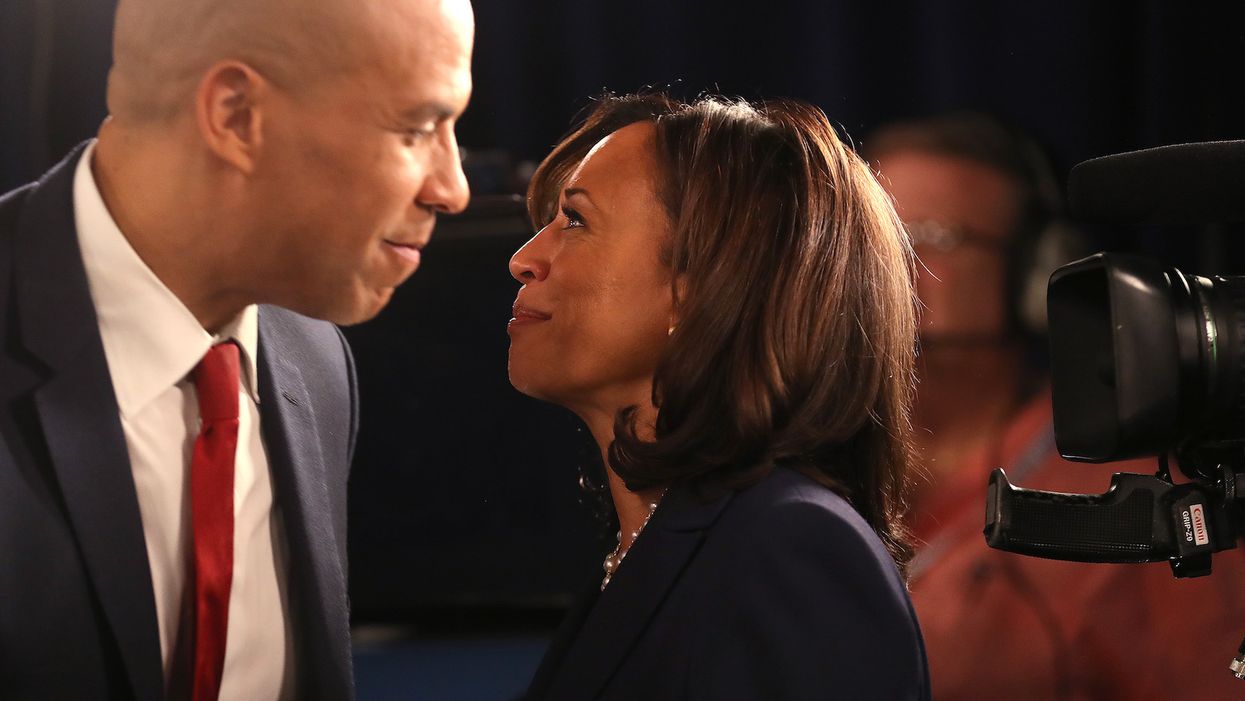
Justin Sullivan/Getty Images

Race isn't always the issue
The only people who have a chance to be the Democratic presidential nominee are white. The top three who really have a chance are old and white. And the two who really, really have a chance are old, white men.
Now, this doesn't bother me. But it's a big, big problem for Democrats. How could the party that elected Barack Obama enter an election year having shed all its diversity in the early stages of the primary?
One of the larger questions surrounding Democrats' all-white debate stage — slated at 9 p.m. ET Tuesday at Drake University in Des Moines, Iowa — is: What happened to the promising black candidates, Sens. Cory Booker (D-N.J.) and Kamala Harris (D-Calif.)? Was the system rigged against minorities?
I get why someone would ask this question. But I think it demonstrates a misunderstanding of how people choose a preferred candidate, and overstates the degree to which candidates' race factors into that decision.
I won't try to speak for every black person, and I definitely won't try to speak for Democrats. I'll just talk about myself.
I like seeing black political candidates succeed. Democrat or Republican. It doesn't mean I always want them to win, but I do want them to perform well. I pay attention to them. That's my personal bias. Generic black candidate ____ will get my initial attention more than generic white candidate _____. Whether that's Barack Obama, Ben Carson, John James, or whoever. But that doesn't mean, like some seem to falsely believe, that being black is enough to hold my attention as a black voter for the entirety of a race.
I had high expectations for Harris' campaign. She seemed to check the many political boxes that a Democratic nominee would need to check. A black woman with high name recognition, a strong resume, and the toughness to hold her own on a debate stage with anyone. Liberal to be sure, but not too far left for mainstream Democratic voters.
But she didn't have a set stance on health care and she didn't have a good answer for choices she made as a prosecutor in California. As it turned out, those things mattered more than her blackness and pandering (seemingly untrue) stories about smoking weed in college while listening to Tupac and Snoop.
Booker had a similar profile to Harris as a well-known senator who'd had plenty of national exposure through judiciary committee hearings. He has a dramatic tendency about him that I, and most Republicans, find unbearable, but which seemed to have an appeal to Democratic voters who share his beliefs.
But his campaign lacked a competitive edge, and he failed to demonstrate in any way why he was better or different than any of the other candidates. His campaign had no identity, and as a result, it was quickly forgotten in the shuffle of more dynamic candidates. Being black and living in a neighborhood with lots of violent crime do not make a presidential identity.
I'm not a Democrat. But in covering their primary, I try to evaluate the candidates as a voter trying to choose the best one. Harris and Booker are black — that's great, and it got my attention in the beginning — but they never did anything to convince me, or most actual Democrats, that they should be president.
Some people think Barack Obama won in 2008 because he's black. I don't think that's true. I think his race gave him the same starting point as Harris and Booker had. It helped sparked an initial interest in his political potential to reach various segments of the population. But he won because he was good at running for president, and he had a message that resonated with people for that particular moment in our nation's history. As a result, he attracted a diverse coalition of voters that Harris and Booker tried, and failed, to retrieve after it dispersed in 2016.
Being black isn't what caused these two candidates to lose. Candidates have to connect with something voters want, regardless of their race. Bernie Sanders and Elizabeth Warren connect with voters who want a revolutionary change in how our country operates. Joe Biden connects with voters who want things to be familiar and calm and stable.
Biden isn't leading primary polls because he's old and white. He isn't winning black voters just because he was VP to the first black president. He's winning because in the face of a potential socialist upheaval, he feels like a safe choice for most Democrats. He's the candidate for Democrats who don't like Donald Trump, but who still think the country is mostly OK.
Kamala Harris didn't lose because she's black. She lost because she felt inauthentic, like she was fishing for what people wanted from her rather than showing them who she is. Cory Booker didn't lose because he's black. He lost because America isn't in the mood for a touchy-feely let's-all-get-along president in this contentious era of politics. Debate qualifying thresholds aren't racist, as Booker has implied. America isn't too racist to elect a black woman, as Harris has implied.
Race can be an easy narrative to plug in to any situation, but it's often the wrong lens through which to evaluate something. Race can bring attention, or the benefit of the doubt, to a candidate, but support must be earned. As long as Democrats fail to realize that, they'll keep asking the wrong questions.